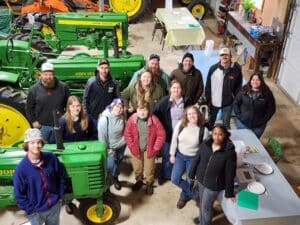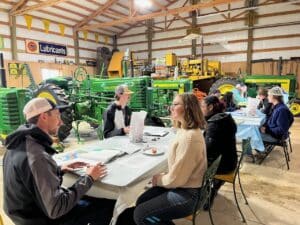BACKGROUND | PROCESS | INSIGHTS
Background
Farmers and ranchers work the land day after day. Many of us admire this fact. But farmers (and ranchers) may care about their land in ways that are quite different from the standard environmental agenda, especially in the context of climate change.
A number of studies have explored farmer perceptions of climate change (Soubry, Sherren, and Thornton 2020). As you might imagine, many farmers are closely attuned to weather fluctuations, and thus have firsthand observations to bolster their understanding of climate change and its effects on agriculture.
But farmers have often expressed concern over the impacts of climate and other environmental policies on their livelihoods. One example has been a number of organized protests in Europe, such as protests over livestock reductions necessary to cut nitrogen emissions in the Netherlands (Moses 2022), and a larger set of protests in summer 2023 (Pronczuk and Moses 2023):
This summer, scores of farmers descended on the European Parliament in Strasbourg, France, to protest against new E.U. rules aimed at restoring natural areas and cutting emissions that contribute to climate change. Farmers have protested in Belgium, Italy and Spain, too. The discontent has underscored a widening divide on a continent that is on the one hand committed to acting on climate change but on the other often deeply divided about how to do it and who should pay for it.
Though some summaries of these protests have been largely sympathetic, others have been critical of ways they defend outmoded practices via political populism (Van Der Ploeg 2020).
Process
We wanted to hear directly from farmers, and to listen to them systematically to better appreciate the possibility that “many care, just differently. “ We thus connected with the Oregon Farm Bureau,
…a grassroots, nonpartisan, nonprofit organization representing the interests of farming and ranching families in the public and policymaking arenas. With nearly 7,000 member families professionally engaged in agriculture, Farm Bureau is Oregon’s largest general agriculture advocacy organization, representing all farm sizes, production methods, and commodities. Our ultimate aim is the survival, success, and sustainability of family farms and ranches in Oregon.
In particular, we worked with farmers from Young Farmers and Ranchers, supporting OFB members of a younger age.
We started our visit on April 6, 2024 at TMK Creamery near Canby, Oregon, a livestock operation that has intentionally opened up to the public to address their questions and concerns. We appreciated Marc Koch, the head dairy person for TMK, for his guidance through the creamery and their treatment of livestock.
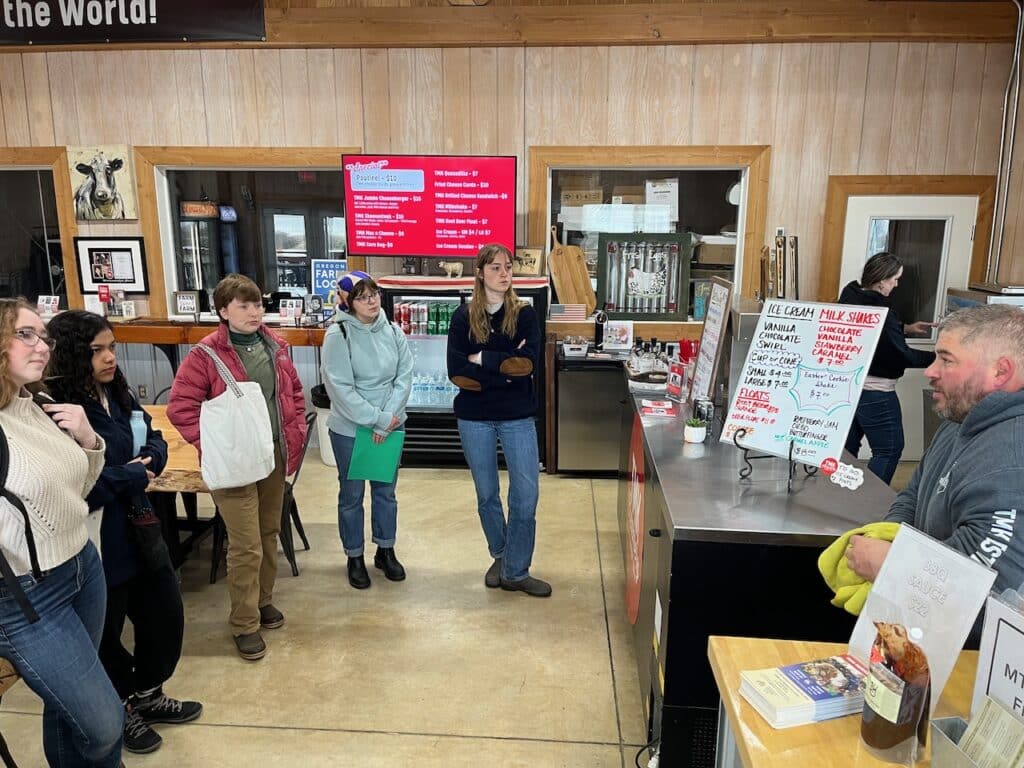
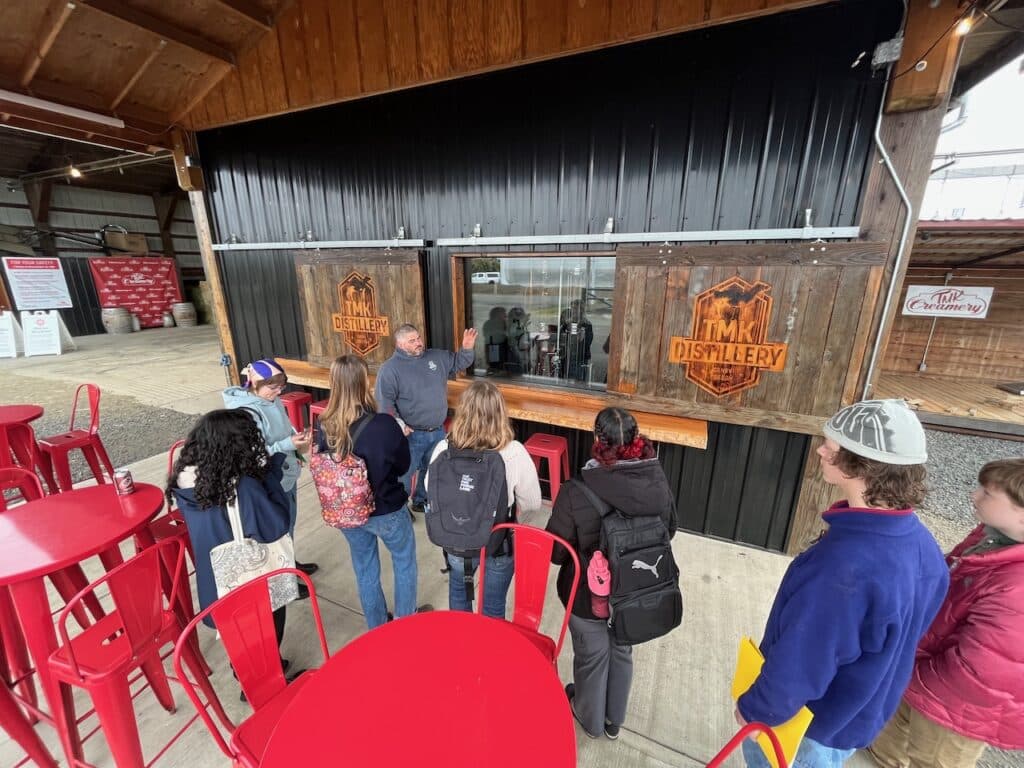
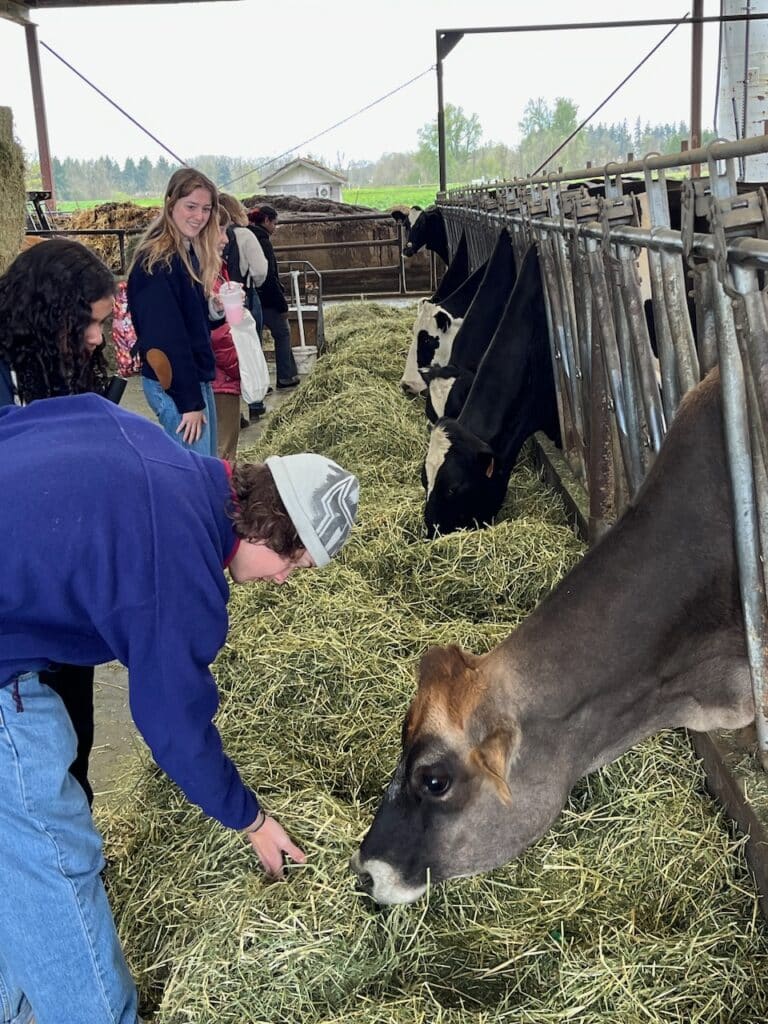
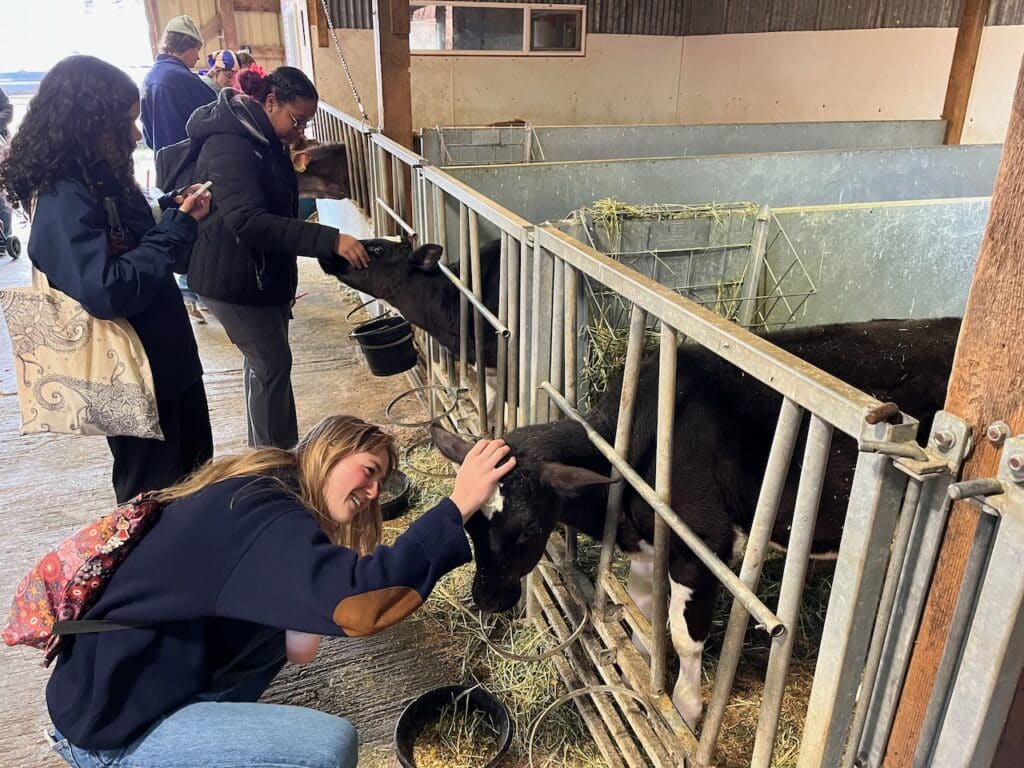
Students visiting TMK Creamery, April 6 2024. Click to expand.
We then traveled to the tractor museum of Roy Hofer, YF&R chair, near Canby to meet up with YF&R members, engage in dialogue, and do our “systematic listening,” using the same interactive field survey we had previously deployed for our Street Roots and First A.M.E. Zion gatherings.
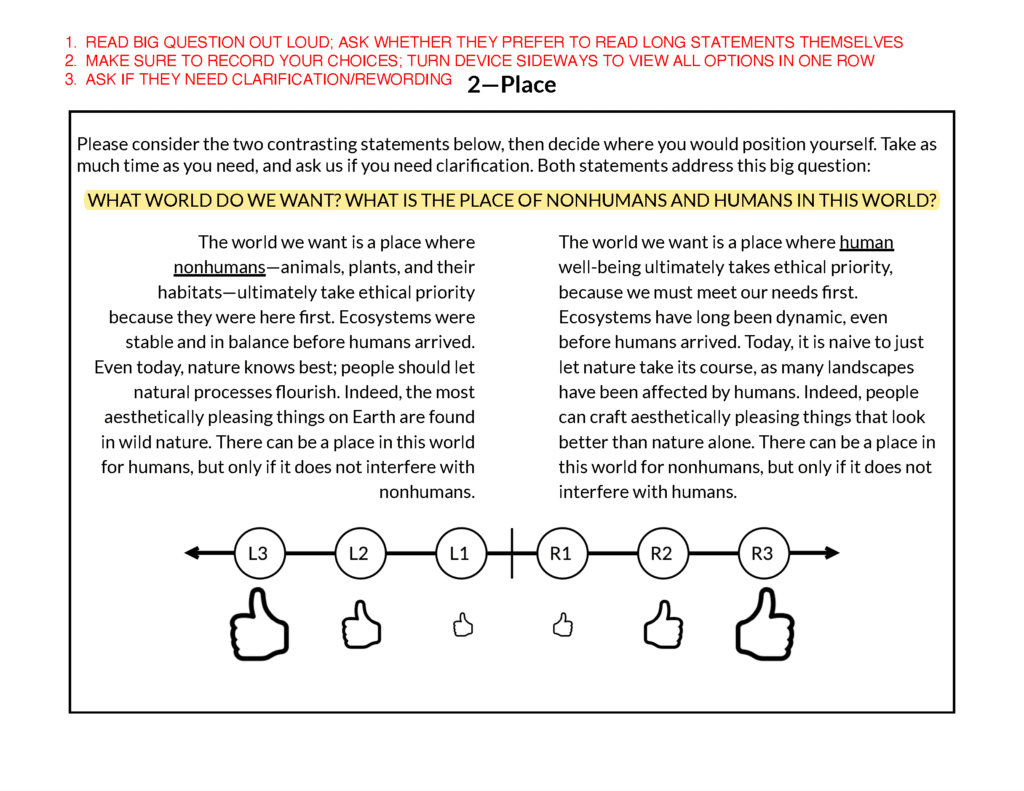
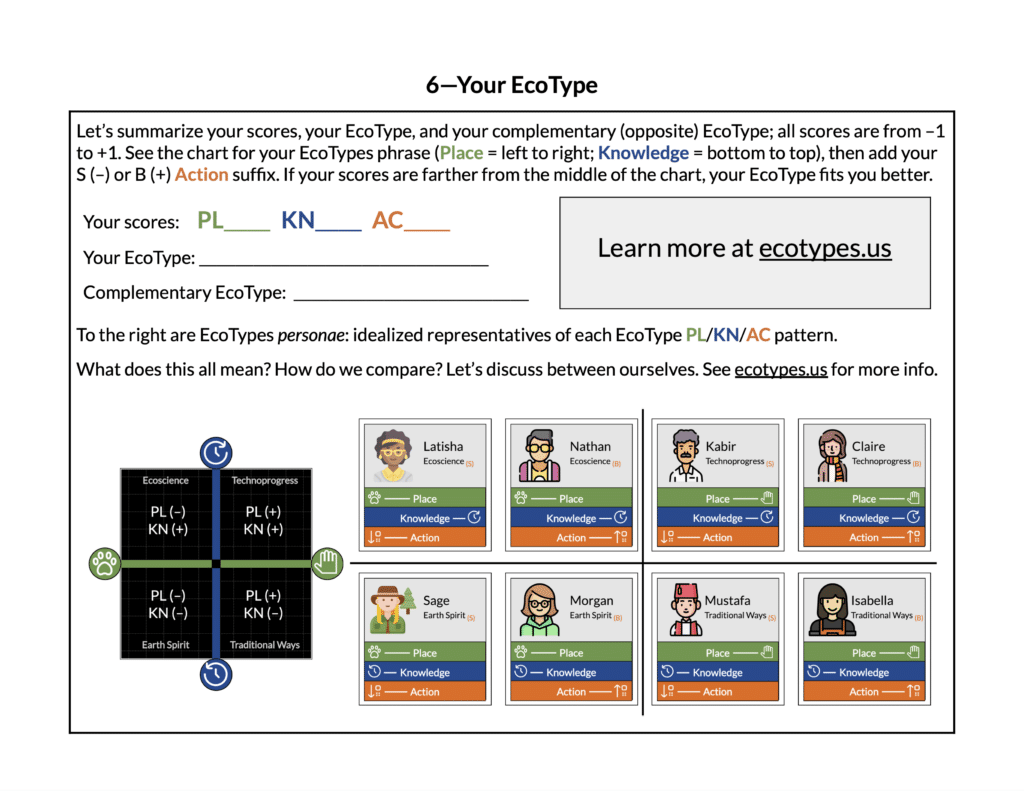
(L) Student version with instructions. (R) Participant summary page. Click to expand.
The in-person survey consisted of a 6-page booklet each participant was given to keep, while the student version included instructions on each page; see samples above. The survey consisted of four sections:
- An introduction to the survey, including data disclosure and consent.
- The Place, Knowledge, and Action narrative pairs of the brief theme survey.
- An SDG priorities page.
- A summary page for the participant to learn their EcoType.
Insights
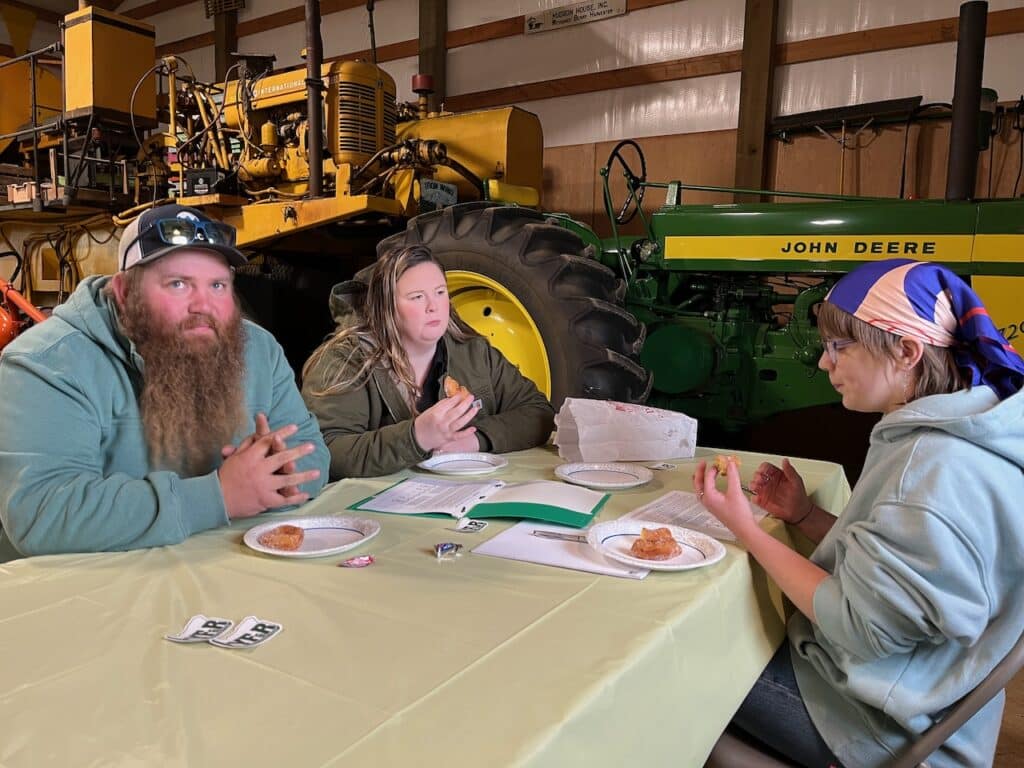
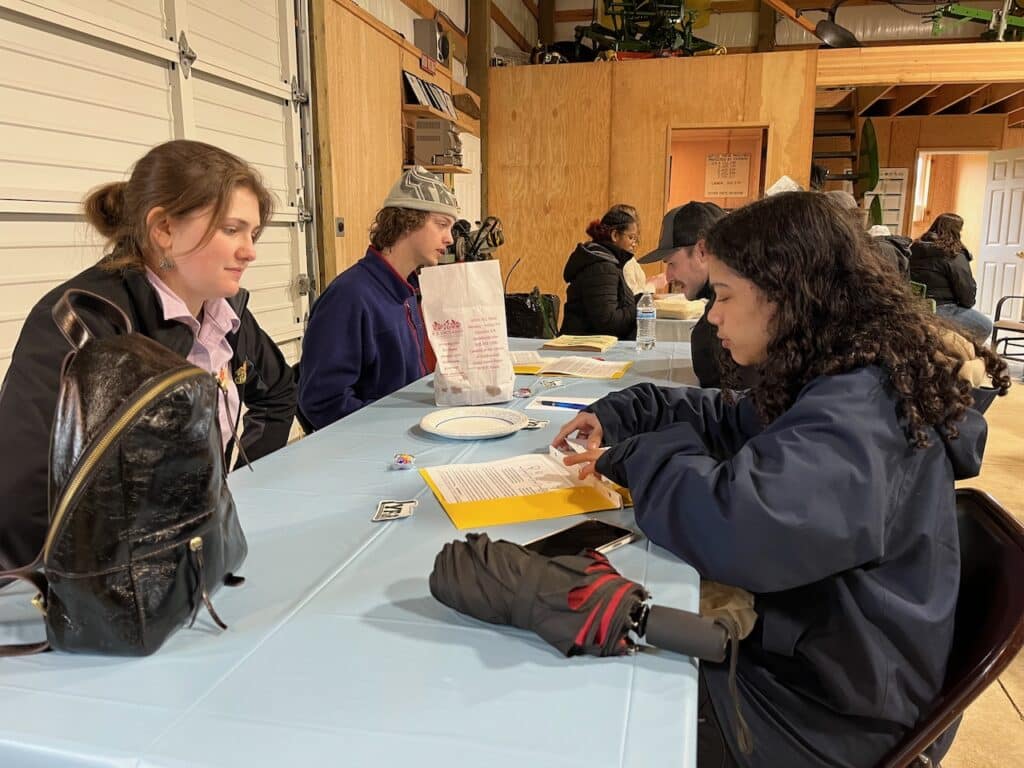
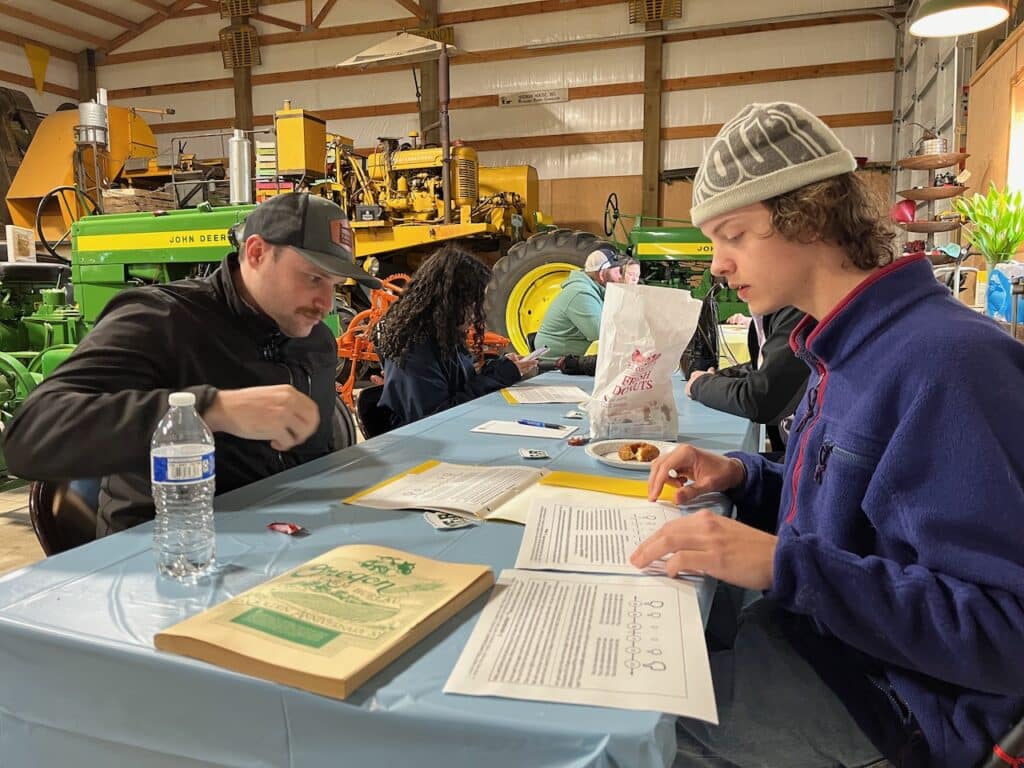
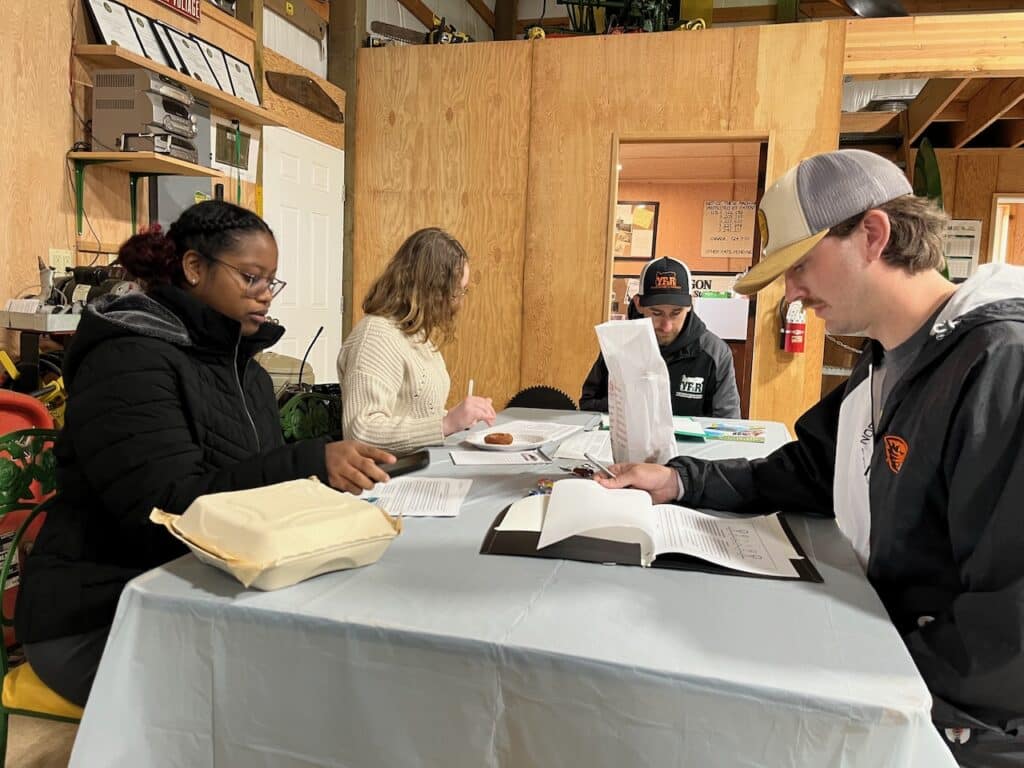
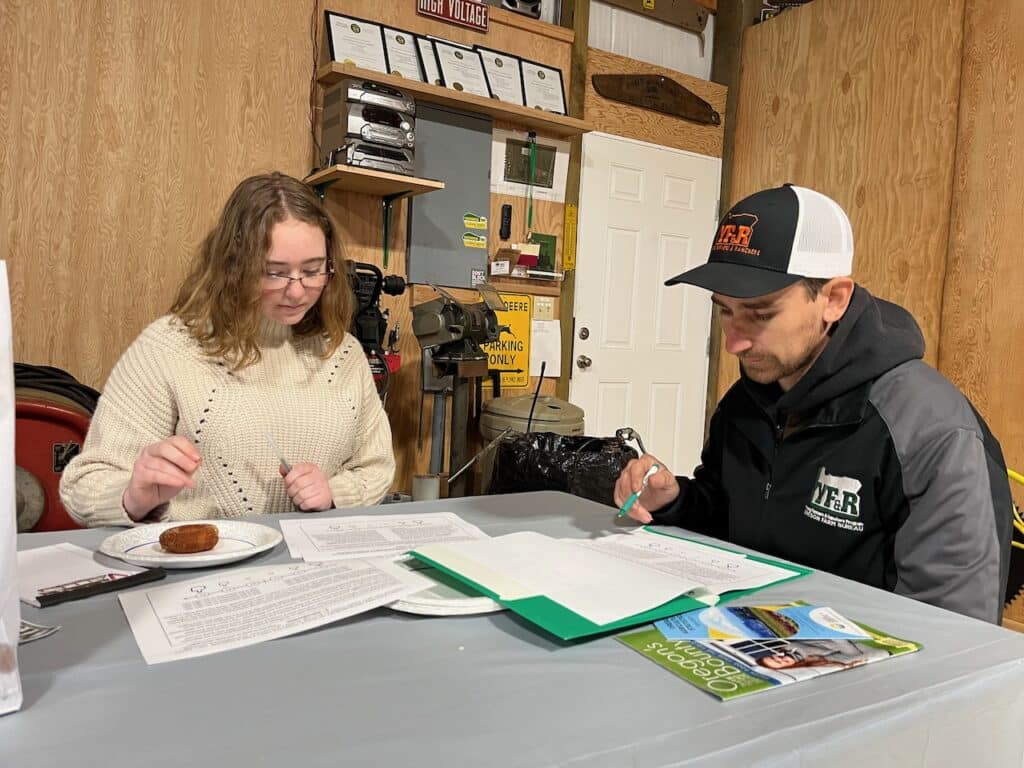
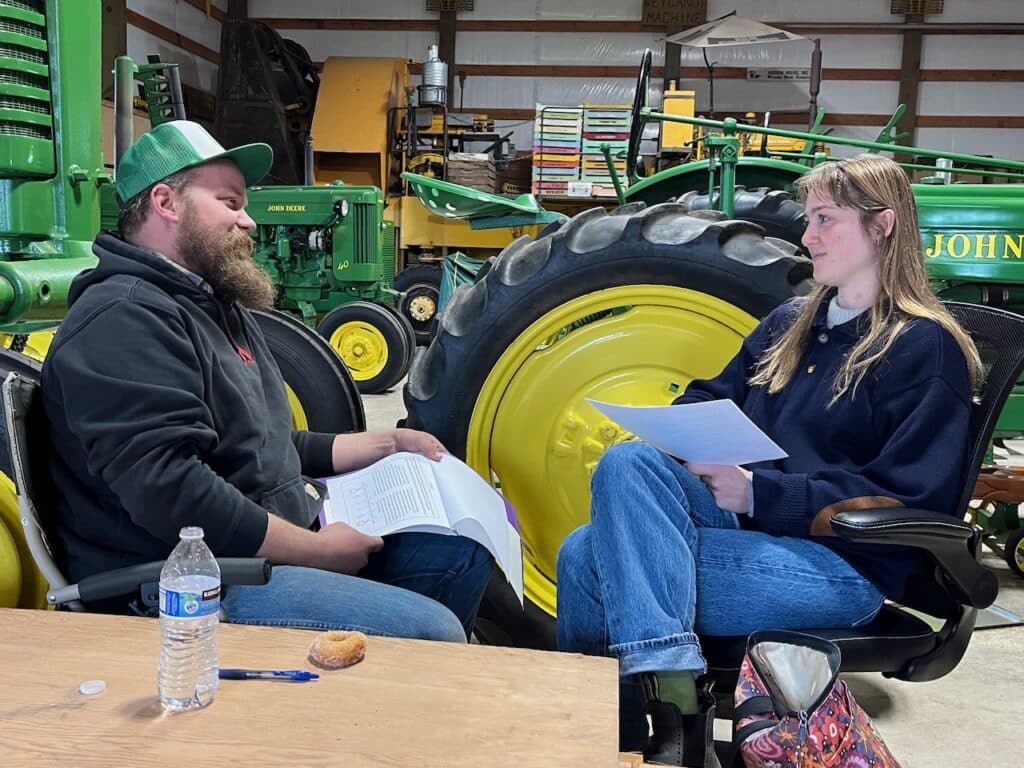
Students doing 1:1 dialogic EcoTypes surveys with Young Farmers & Ranchers.
Our students had a rich day at TMK Creamery and with YF&R members. Their reflections following the day suggested that they experienced our EcoTypes possibility, “many care, just differently,” firsthand through these conversations.
Difference is not necessarily an easy thing, but students felt that conversations were respectful—and, of course, with people who deeply care about the land they tend as farmers and ranchers. Though their views may have challenged our students in some ways, they were communicated in a manner to which students were receptive. In some instances, students sensed points of important agreement, but in others there were genuine differences, as expected.
How did YF&R members express their EcoTypes via the brief, interactive theme survey? Here were some important patterns we learned:
- Their EcoTypes Knowledge scores were comparable to those of students, being mixed between old and new Knowledge. But their Place and Action scores were quite different.
- The average YF&R Place score was +0.2, tending toward human Place, in contrast to students’ average Place score of -0.3, leaning toward nonhuman Place. The contributing axes to Place—Aesthetics, Ecosystems, Ethics, and Nature—each have their respective axes leaning toward nonhuman vs. human Place, but overall it was understandable that a farmer’s active working of the land to produce something of important human benefit led them to be more comfortable with human Place. Students realized that their experience of land is a different one, leading them toward nonhuman Place.
- The average YF&R Action score was -0.4, strongly leaning toward small Action, whereas students’ average score was +0.1, leaning somewhat toward big Action. We had seen a similar tendency toward small Action in past, especially in the First A.M.E. Zion community, and understood it in part given their differing (older) age relative to students, but YF&R members are only slightly older than our students. From other EcoTypes results, however, we know that Action and political inclination are correlated, with those favoring big Action generally leaning toward the left of the political spectrum—likely not the general tendency among YF&R members. So, this difference in terms of Action may also reflect a difference in politics.
- The overall pattern of YF&R EcoTypes, as suggested above, favored human Place EcoTypes, with Technoprogress (50% of responses) and Traditional Ways (25%) as among the most significant. With Technoprogress in particular, YF&R members expressed some reservations regarding unchecked technology, but shared numerous examples of how their daily farming lives were aided in important ways by technological advancements, offering improved productivity and benefits to soil, water, and other natural resources. There was some overlap with student theme survey results, where 22% were Technoprogress, but 0% of students were Traditional Ways and their largest fraction, Ecoscience (41%) scored 0% among YR&R members—likely again a function of the nonhuman (students) vs. human (YF&R) Place difference.
- The SDG priorities of YF&R members included understandable ones: the top priority was Zero Hunger, with 75% of members including it among their top four. There was some overlap with students: Quality Education, for instance, had 63% YF&R support and 33% student support. But, in general, the priorities of these two groups diverged quite a lot: Climate Action, the #1 student priority (63%), had zero votes among YF&R members, or Decent Work and Economic Growth, one of the top YF&R priorities (50%), had only 7% support among students. The differences between students and YF&R members among EcoTypes themes and EcoTypes, then, only grew as they moved toward their policy priorities for our world.
All in all, these EcoTypes results are broadly in line with what one might expect of farmers and ranchers, but more significantly, our students had a powerful experience dialoguing respectfully and thoughtfully across such differences. Here is a comparison of all spring 2024 MCJD community interactions.
We very much appreciate the Oregon Farm Bureau, Young Farmers and Ranchers, and TMK Creamery for their time and willingness to interact with our students.
References
Moses, Claire. 2022. “Dairy Farmers in The Netherlands Are up in Arms over Emission Cuts.” The New York Times, August 20, 2022, sec. World. https://www.nytimes.com/2022/08/20/world/europe/netherlands-farmers-protests.html.
Pronczuk, Monika, and Claire Moses. 2023. “Labeled Climate Culprits, European Farmers Rebel over New Standards.” The New York Times, August 26, 2023, sec. World. https://www.nytimes.com/2023/08/26/world/europe/europe-farmers-climate-change.html.
Soubry, Bernard, Kate Sherren, and Thomas F. Thornton. 2020. “Are We Taking Farmers Seriously? A Review of the Literature on Farmer Perceptions and Climate Change, 2007–2018.” Journal of Rural Studies 74 (February): 210–22. https://doi.org/10.1016/j.jrurstud.2019.09.005.
Van Der Ploeg, Jan Douwe. 2020. “Farmers’ Upheaval, Climate Crisis and Populism.” The Journal of Peasant Studies 47 (3): 589–605. https://doi.org/10.1080/03066150.2020.1725490.
